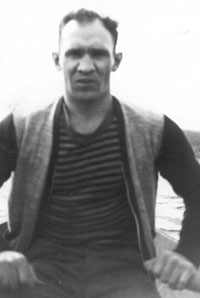Musings
an Online Journal of Sorts
By Alyce Wilson
January 21, 2004 - Family Fish
This past weekend, The Gryphon and I saw Big Fish, which got me thinking about storytelling in my own family.
Now, my mom doesn't exactly tell tall tales, but I remember getting angry with her because she would tell stories to people that weren't entirely true.
I'd protest. "That's not how it happened, Mom." And she would just smile and continue telling her story.
They aren't entirely fake, these stories. She'd take a kernel of truth and interpret it, embellish it, give it an interesting ending, or in most cases, a punchline.
This could be frustrating if the punchline involved me, especially when it wasn't entirely true.
Pop-pop, which was what I always called my mother's father, was a storyteller of a different sort. Almost of the tall tale variety. I don't doubt that about 90 percent of what he told us was true, but there were times when his versions of stories don't jive with what others say.
For example, Pop-pop always had a badly broken nose. He'd always told us that he broke his nose in a fight during the Prohibition when somebody tried to give him homemade bathtub gin, and he claimed it was actually rubbing alcohol and would make him blind.
Years later, we were talking to Aunt Rage, his sister (Rage being short for Regina). She said that, in fact, he'd been stepped on by a horse. She didn't explain further.
Then there was the story about how he left Penn State. Pop-pop attended Penn State for one year, 1927. He told us that the reason he left was because of his brother.
You see, his brother had been footing the bill to send Pop-pop to college and was bragging about this. He told everybody, "I could have gone to college, but I'm paying for Stack to go." (Stack was Pop-pop's nickname, short for Stanley. He was also nicknamed "Crash," for playing on the football team.)
So Pop-pop told us that he didn't want to be seen in his home town as an ingrate who was limiting his brother's opportunities.
Aunt Rage had a different version of this story. "He left over a girl," she said tersely. We asked her to elaborate, and to tell us why he might have given us a different version of the story.
"Who knows why that boy does what he does?" she harumphed.
We also know that Pop-pop changed his name once he got back from Penn State from his unpronounceable multi-syllabic last name to a simple English one. We talked about it and decided that with Pop-pop's sense of pride, he was probably also unwilling to go through the humiliation levied on freshmen at that time. It's also possible that he met with teasing because of his Polish name.
Any one of these versions may be true, perhaps all of them.
Pop-pop loved to tell stories. Most involved fights or feats of daring. For example, the time he outran a forest fire.
There were also stories about his work in the mines. He was first aid, which meant he was the first one there, to identify the body. Terrible stories, such as the time he had to hold a man's face together so they could make a death mask.
Pop-pop was only about my height, 5'5", and he became a body builder to be tougher, I suppose. He told us how he used to toss a barbell from one hand to the other, impressing the ladies. I've seen pictures of Pop-pop in a loincloth, posing to show off his muscles, so I know this much is true.
I don't doubt, either, that he met my grandmother, whom I always called Nana, the way he said he did. She was a telephone operator, and he fell in love with her voice. He used to call her to ask her the time, just to hear her speak.
Finally, he got up the nerve to ask her out. She was just as beautiful as he'd imagined, so they began to date. When his Polish Catholic family disapproved of him marrying a German Protestant, he quit the church and turned his back on his family.
At least, that's what he told me. Mom says the reality was a little different. She remembers Fridays when she and Nana would travel with Pop-pop to his hometown. They would occupy themselves elsewhere while he'd visit. She also says that when her relatives saw Mom, they would cry, because as far as they were concerned, she was going to hell.
When Pop-pop died, Mom was going through his things. She found his birth certificate and burst into tears. His real first name, it turned out, was not Stanley at all, but Bernard.
"I don't really know him," she said. "I don't know anything about him."
"Yes, you do," I told her, hugging her. "Yes, you do."
If you look at the stories he told over the years, you find out who he wanted to be, which is more important. He wanted to be a strong man, a tough man who would stand up for his principles. A man with a high sense of honor. A hero. A man who could meet any challenge.
Maybe he was a little harsher judge of himself than others would have been, so in his versions of stories, he never doubted, never was confused or conflicted.
And these stories he passed down to my mother, my siblings and me, were stories about the qualities he wanted us to admire, the person he wanted us to be.
Through storytelling we edit our lives, shape it and make it shine.
Moral:
Just because it's not entirely true doesn't mean it's a lie.
Copyright
2004 by Alyce Wilson
What
do you think? Share your thoughts
at Alyce's message board (left button):
![]()
![]()


